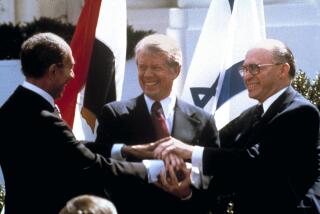U.N. Troops Would Be Seen as ‘Hostile,’ Sudan Letter Warns
- Share via
UNITED NATIONS — Darfur is edging closer to catastrophe, Secretary-General Kofi Annan said Thursday, as the Sudanese government warned that countries sending troops for a U.N. peacekeeping force there would be committing “a hostile act.”
The letter, sent by Khartoum to dozens of nations, said Sudan would consider a U.N. force “a prelude to an invasion of a member country of the U.N.” The Security Council denounced the letter in an emergency session Thursday afternoon as an “aggressive gesture” that constituted “unacceptable behavior.”
U.S. Ambassador John R. Bolton said the “unprecedented” letter seemed aimed at justifying any attacks on a potential U.N. force that Khartoum does not want, and he said it was a direct challenge to the Security Council’s authority.
“They are trying to intimidate troop-contributing countries,” Bolton said. “If this is allowed to stand, it could mean the failure of the [U.N. Darfur force] before it begins.”
More than 200,000 people have been killed in three years of fighting between Sudanese government-aligned militias and rebel groups, and about 2.5 million have been displaced.
The Security Council has approved a force of as many as 22,600 soldiers and police officers to take over from a faltering African Union peacekeeping force of 7,000 troops and monitors, but Khartoum repeatedly has rejected non-African troops on its soil.
Sudanese President Omar Hassan Ahmed Bashir wrote in a separate letter to Annan this week that he would accept only a bolstering of the African Union forces in the western province, despite the regional group’s warnings that it is unable to protect civilians and wants to hand over its mandate to a U.N. operation.
Bashir told the General Assembly in New York last month that he viewed calls for a U.N. force as a path to an Iraq-style occupation, and as a Zionist-led plot to dismember and weaken his country.
Not all diplomats shared Bolton’s outrage. Tanzanian Ambassador Augustine Mahiga said it was important to persuade Khartoum to accept the United Nations’ help, and to not alienate the government.
Greek Ambassador Adamantios Vassilakis said, “What is important is how we will find a solution to save lives.”
The head of U.N. peacekeeping operations, Jean-Marie Guehenno, asked nations last week to contribute soldiers and police so the force would be ready to move in as soon as Sudan agreed. Guehenno said Wednesday that he would continue to solicit troops but that a U.N. force could not operate in Darfur until the rebels and government stopped fighting and Khartoum consented to the troops’ presence.
In the meantime, attacks in Darfur this week caused about 10,000 displaced people to flee their U.N. camp, monitors said.
In a report to the Security Council on Thursday, Annan said a May peace deal between rebel groups and the government was falling apart, and that Sudan’s army, the government-backed militias and rebel groups continued to violate human rights with impunity.
Humanitarian access is at its lowest level since 2004, he said, as aid workers pull out amid increasing attacks.
Noting that the Darfur peace agreement has been in effect for months, Annan went on to say, “However, instead of reconciliation and building of trust, we are witnessing intensified violence and deeper polarization. The region is again on the brink of a catastrophic situation.
“Unless security improves, the world is facing the prospect of having to drastically curtail an acutely needed humanitarian operation.”
More to Read
Sign up for Essential California
The most important California stories and recommendations in your inbox every morning.
You may occasionally receive promotional content from the Los Angeles Times.













